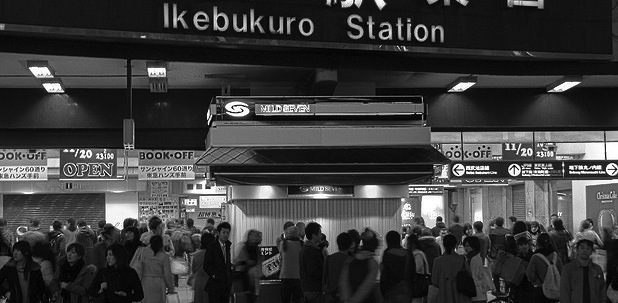Culture shock: Welcome to Japan; Bright lights and broken suitcases

I suffered my first major screw-up in Japan, literally within the first hour of arriving.
Imagine the relief one can feel after a 17-hour flight, to be finally getting on the train, headed towards the hostel, and finally here after months of hard work in preparation.
Imagine then, the immediate panic of realising that your passports, ¥60,000 ($800) and all the information for your bookings are still on the train platform, zooming into the distance behind you.
You might be wondering how it could be possible to make such a rookie mistake. But when your train is leaving in less than a minute and you have several large suitcases nearly the same size as you, to transfer over in that short space of time, mistakes are easy to come by.

Everyone has lost their passport at some point, but not usually in a country where you can barely speak the language, can't understand the alphabets (plural: there are three), and have no more money to get back home.
There was something incredibly surreal about sitting in the platform office in Tokyo, whilst the poor attendant given the job of making sure you get on the right train, attempts to communicate with you in limited English. I was grateful that I'd brought my Amazon Kindle in my hand luggage, ready and loaded up with a plethora of books, including a Japanese key phrase book.
That e-book was a lifesaver.
By the time we made it to Ikebukuro, I was exhausted and frustrated, carrying heavy bags and a broken suitcase; while not even slightly prepared for the heavy, complex and demanding streets of Tokyo.
It was late, a Thursday night, and the streets were packed solid. It was incredibly disorientating, being suddenly surrounded by crowds of thousands of people. The station was gargantuan, and one could easily get lost in the labyrinth of the station, the second largest subway and railway station in Tokyo -- and we did.
When we emerged, however, a big neon sign of 'home' instantly met us. Our instructions read clearly: "Look for the McDonalds, and head left". I was actually surprised by how much English there was to see, from Kentucky Fried Chicken to Starbucks Coffee, Tokyo had clearly adopted vast elements of Westernised consumer culture, but I'd never really realised how much until I saw it.
It was 1 a.m. by the time we arrived at the hostel: a 24-hour business, Internet café and international hostel.
Our warm welcoming party got us to our room and immediately invited us to come for a free Japanese lesson and a party. You can't ask for much more than that to battle your culture shock.
It's something people warn you about, and if I hadn't had to drag a broken suitcase through the streets in order to get to my bed for the night, I have to tell you -- I would have broken down. The whole experience was completely overwhelming.
The place is so much louder and busier than anywhere I'd ever been, and we were not even in central Tokyo. The sudden influx of new information, new sounds, and desperately trying to make some sense of the language I was bombarded with at every turn. It was a lot to handle.
At the time I assumed that this was the absolute worse it could get, and decided that having survived that, the rest would be a piece of cake compared.
I had no idea at the time just how difficult it is to get started as a foreigner in Japan, or that this was actually one of the easier issues I was going to have to deal with. I can tell you, happily, that it was probably the only time I really felt the true enormity of 'culture shock'.
Once you realise that everything you've taken for granted to this point is now defunct and useless, there's really no other way to go than to dive straight in.
So I did.